
U.S. Sen. Shelley Moore Capito (R-WV) on Feb. 7 reintroduced a bipartisan bill that would amend the Clean Air Act to direct the Environmental Protection Agency (EPA) to support carbon utilization and direct air capture research.
“This bipartisan legislation is part of a smart all-of-the-above energy plan,” said Sen. Capito (R-WV), one of the bill’s original cosponsors.
The Utilizing Significant Emissions with Innovative Technologies (USE IT) Act, S. 383, also would direct the Council on Environmental Quality (CEQ) to establish guidance to assist project developers and operators of Carbon Capture, Utilization, and Storage (CCUS) facilities and CO2 pipelines.
“By providing incentives for the deployment of carbon capture technologies and regulatory certainty for those trying to reduce their emissions by using their carbon, we’re building on America’s energy leadership and investing in innovative ways to use our energy resources,” Sen. Capito said last week.
Additionally, S. 383 would establish task forces to gather input from stakeholders to update and improve guidance and would create mechanisms to incentivize the buildout of CCUS projects.
Among the eight original cosponsors joining Sen. Capito in introducing the bill, which was sponsored by U.S. Sen. John Barrasso (R-WY), was U.S. Sen. Sheldon Whitehouse (D-RI).
“Congress needs to help make American energy as clean as we can, as fast as we can, without raising costs on consumers,” said Sen. Barrasso, adding that S. 383 would promote the long-term use of states’ natural resources, in turn helping to support America’s energy dominance.
“This bill supports groundbreaking innovation to address climate change,” the senator said. “Carbon capture and utilization technologies hold the key to major emissions reductions. The bipartisan legislation supports efforts to find profitable uses for captured carbon dioxide and simplifies the process for building carbon dioxide pipelines.”
Sen. Whitehouse pointed out that he’s been working across the aisle on ways to bolster new technologies like direct air capture.
“The science from the world’s top experts, including our own National Academies, shows that we ought to be reversing the carbon pollution driving climate change. If we don’t, it will be nearly impossible to avoid the worst of climate change,” he said.
If enacted, S. 383 also would clarify that CCUS projects and CO2 pipelines are eligible for the federal permitting review process and would build on current federal law to extend and expand the 45Q tax credit toward providing certainty to utilities and other industrial sources, according to a summary provided by the lawmakers.
S. 383 is the reiteration of the March 2018 same-named S. 2602, also introduced by Sens. Capito, Barrasso, and Whitehouse during the 115th Congress. The U.S. Senate Environment and Public Works Committee on May 24, 2018, approved S. 2602, but the bill never received action by the full U.S. Senate.
The new bill, S. 383, also has been referred for consideration to the Senate Environment and Public Works Committee.



